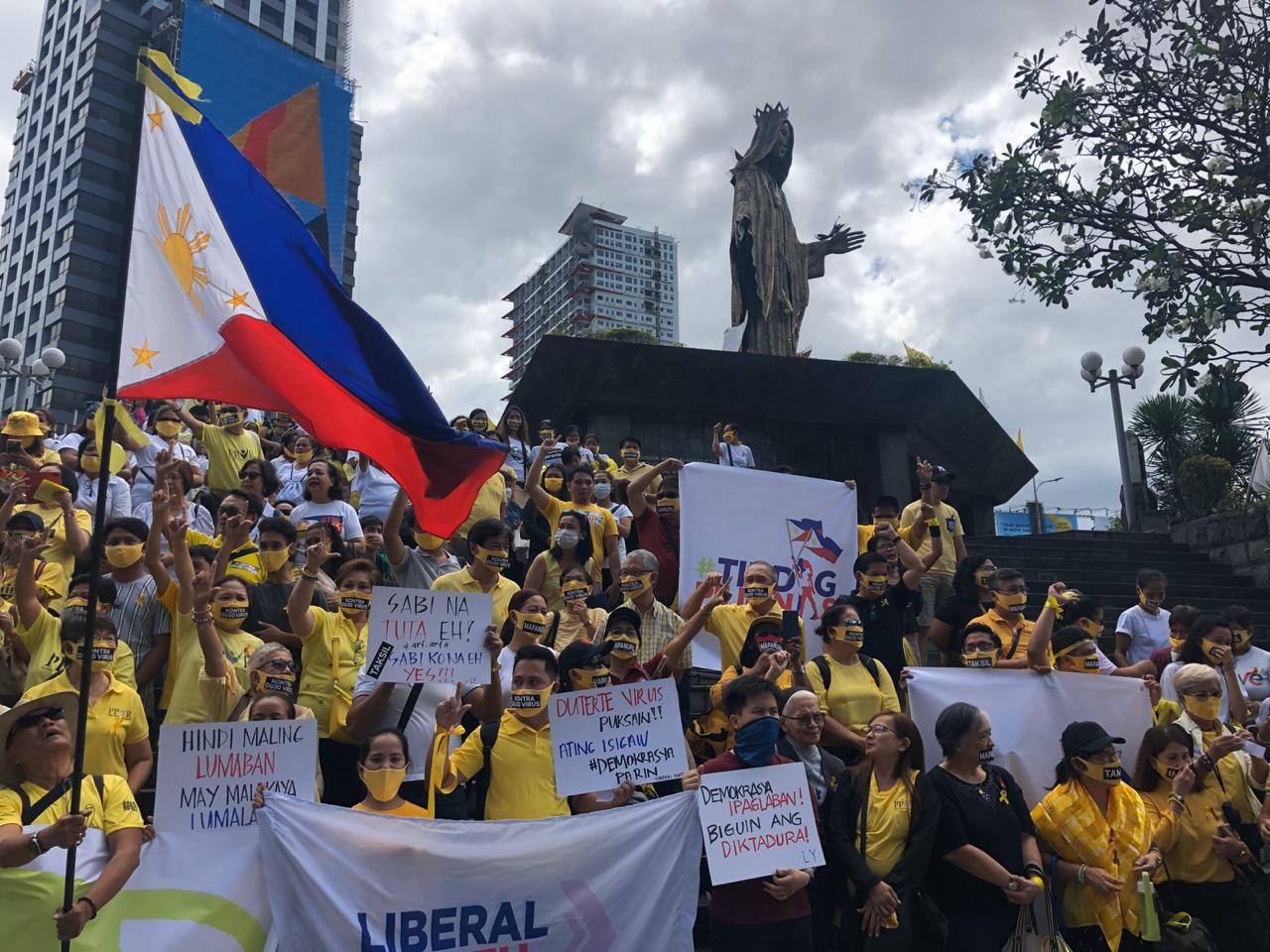
Activist stage protest at the Edsa Shrine in Pasig City condemning President Duterte’s policies on Feb 25 during the commemorations of the 34th anniversary of Edsa People Power a bloodless revolution that made the dictator stepped-down from highest post in the land. Noy Morcoso/INQUIRER.net FILE PHOTO
Martial law survivors, activists and civil society groups vow not to let the 37th anniversary of the 1986 Edsa People Power Revolution—the first commemoration under the second Marcos presidency—go gently into the night.
They laid out on Thursday a lineup of activities to mark the historic, four-day revolution that ended with the ouster of dictator Ferdinand Marcos and his family from Malacañang on Feb. 25, 1986.
“Edsa does not deserve to be marked with deafening silence. It should be commemorated with a fiery commitment to achieving genuine freedom and democracy,” said Bayan secretary general Renato Reyes, one of the organizers.
“Its lessons remain valid today as we collectively confront a second Marcos regime. Many of the issues that people stood for in 1986 remain very much valid today and are the issues that push us to protest,” he added.
Silent last Sept. 21
The Marcos administration virtually stayed silent during the 50th anniversary of the declaration of martial law on Sept. 21 last year.
A “calculated state neglect” was how a scholar, Joel Ariate of the University of the Philippines Third World Studies Center, described the Palace behavior during the occasion.
“This isn’t just them being ‘ashamed’ but a systematic devaluing of the significance of the act of memory … (to reduce) it to islands of commemoration or resistance,” he told the Inquirer.
Still, some government agencies under the Marcos administration remain committed to the commemoration of Edsa being a special nonworking holiday. The National Historical Commission of the Philippines (NHCP), in coordination with the Spirit of Edsa Foundation (Soef) and the Quezon City local government will lead commemorative activities at the Edsa People Power Monument on Saturday.
Expected to lead the event are Quezon City Mayor Joy Belmonte, NHCP Chair Rene Escalante and Soef commissioner Christopher Carrion.
Anti-Marcos groups like the Campaign Against the Return of the Marcoses and Martial Law (Carmma), Movement Against Tyranny, ML50 and Movement Against Disinformation will also hold a program at the monument.
Reclaiming People Power
They will be joined by the cast and directors of two films about the Marcos dictatorship: “Oras de Peligro” by Joel Lamangan and “Ako si Ninoy” by Vince Tañada.
Lamangan’s film depicts the last 72 hours of the Marcoses in Malacañang before they fled to Hawaii in 1986, while Tañada’s project focuses on the martyred ex-senator and Marcos archcritic, Benigno Aquino Jr.
Artists and film groups DAKILA and Active Vista, along with the Bantayog ng mga Bayani Foundation, will stage a collaborative mural painting and musical performances at the Bantayog ng mga Bayani shrine in Quezon City at 1 p.m.
There will also be a screening of “11,103,” Kara Magsanoc-Alikpala’s documentary about the victims of martial law atrocities.
Through these activities, Dakila said, they hoped to “reclaim the truest sense of People Power: That we, the people, are the ones who hold true power.”
Understanding history
Reyes said this year’s Edsa rites would be significant given the recently revived efforts to tinker with the 1987 Constitution, the Charter adopted a year after the revolution and that was hailed worldwide for symbolizing the country’s return to democracy.
“There seems to be a lack of understanding of history in these Charter change efforts. We distrust these initiatives because we have learned the bitter lessons of dictatorship,” Reyes said. “Every time the initiative is meant to prolong the stay in power of the ruling elite, we drift closer to dictatorship.”
The lack of genuine change 37 years after Edsa, he said, “cannot be attributed to the 1987 Constitution.”
“The absence of genuine change can only be attributed to the same ruling classes who have been in power since. These are the same ruling classes that have allowed the Marcoses to return to power in 2022,” Reyes said. “Don’t blame the Constitution for our woes. It is the bankrupt economic and political system that is to blame.”